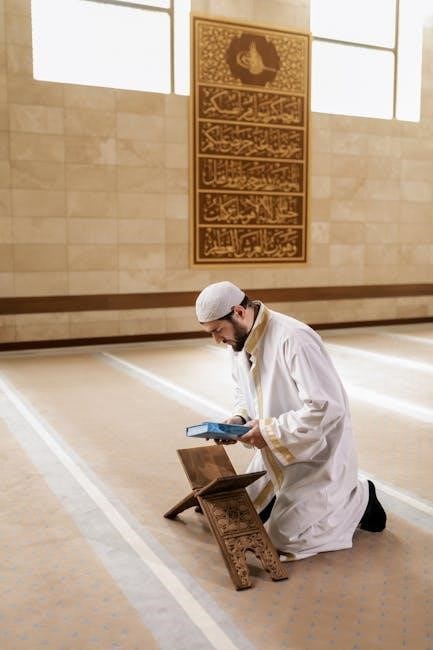“We Live Our Faith Grade 7” is a comprehensive catechetical program designed for young adolescents, focusing on discipleship, sacraments, and prayer, fostering spiritual growth and faith development.
Overview of the Curriculum
The “We Live Our Faith Grade 7” curriculum is a comprehensive, two-volume program designed to foster faith development in young adolescents. Volume I focuses on discipleship, exploring Jesus’ life, teachings, and the sacraments he instituted, while Volume II emphasizes living as members of the Church. The program integrates prayer, reflection, and service, with retreats and activities to deepen spiritual engagement. Aligned with Catholic teachings and educational standards, it provides a structured approach to understanding God’s plan, the Creed, and moral living. This curriculum is tailored for grades 7 and 8, supporting students in their journey of faith and discipleship.
Purpose and Goals of the Program
The primary purpose of “We Live Our Faith Grade 7” is to guide young adolescents in deepening their relationship with God and understanding their role as disciples of Jesus. The program aims to foster a Catholic identity, encouraging students to live their faith through prayer, service, and moral decision-making. It seeks to equip students with the knowledge and spirituality necessary to navigate their faith journey confidently. By aligning with the Six Tasks of Catechesis, the program helps students know, worship, live, and share their faith, preparing them for a lifelong commitment to Christ and the Church.
Target Audience: Grade 7 Students
“We Live Our Faith Grade 7” is specifically designed for seventh-grade students, addressing their unique developmental and spiritual needs. The program focuses on helping young adolescents grow in their faith, fostering a deeper understanding of Catholic teachings and values. It encourages students to embrace their roles as disciples of Jesus, exploring topics such as prayer, sacraments, and moral decision-making. The curriculum is structured to align with the spiritual and intellectual growth of seventh graders, providing engaging activities and reflections that help them apply their faith in daily life. This program is ideal for both parish and school settings, making it accessible to all Grade 7 students seeking to deepen their Catholic identity and faith practice.

Structure of the “We Live Our Faith” Program
The program is divided into two volumes, each focusing on key aspects of faith development. Volume I explores discipleship, while Volume II delves into church membership.
Volume I: As Disciples of Jesus
Volume I focuses on Jesus’ life, teachings, and the sacraments he established. It explores the Creed and Beatitudes, guiding students to understand their role as disciples. Through prayer, reflection, and activities, students deepen their faith, learning to respond to Jesus’ call in daily life. The volume includes retreats and meditations, fostering spiritual growth and a personal connection with Christ. By studying God’s plan and the Church’s teachings, students are equipped to live as faithful disciples, applying Jesus’ lessons in their lives and communities. This foundational volume sets the stage for a lifelong journey of discipleship and faith-centered living.
Volume II: As Members of the Church
Volume II, “As Members of the Church,” deepens students’ understanding of their role within the Catholic community. It explores the Church’s mission, sacraments like Reconciliation, and living faith through prayer and service. The volume emphasizes community relationships, retreats, and reflection activities to foster spiritual growth. By aligning with the Six Tasks of Catechesis, it helps students grow in their faith and understanding of the Church’s teachings. This volume equips young adolescents to live as active, compassionate members of the Church, integrating their faith into daily life and service to others, while nurturing a deeper connection to the Catholic community.

Units and Retreats: A Comprehensive Approach
The program integrates units and retreats to provide a holistic faith formation experience. Units focus on key themes such as the Creed, Beatitudes, and moral teachings, while retreats offer reflective activities, prayer, and discussions. These structured sessions help students deepen their understanding of the Catholic faith and its application in daily life. Retreats also encourage community-building, fostering a sense of belonging among participants. The combination of academic and spiritual components ensures a well-rounded approach to faith development, aligning with the Six Tasks of Catechesis and supported by Sadlier Connect’s digital resources for enhanced engagement and learning.

Key Concepts and Themes
This curriculum explores God’s plan, the Creed, Beatitudes, prayer life, sacraments, and moral teachings, emphasizing faith in action through community service and discipleship.
God’s Plan of Salvation History
God’s Plan of Salvation History is a central theme, exploring humanity’s relationship with God from creation to redemption. It emphasizes the Bible as the story of God’s love, highlighting key events like the Fall, the covenant with Israel, the Incarnation, and the Paschal Mystery. Students learn how Jesus’ life, death, and resurrection fulfill God’s plan, offering salvation to all. The Holy Spirit’s role in continuing this plan is also discussed, helping students understand their place within God’s ongoing story. This section provides a foundation for understanding the Church’s mission and the call to live as disciples, connecting faith to real-life experiences and decisions.
The Creed and the Beatitudes
The Creed and the Beatitudes are foundational teachings explored in the program. The Creed, a statement of faith, outlines beliefs about God, the Trinity, and the Church, helping students profess their faith clearly. The Beatitudes, from Jesus’ Sermon on the Mount, guide followers to live with virtues like poverty in spirit, mercy, and peacemaking. Together, they shape students’ understanding of Catholic identity and moral living, encouraging them to embody these teachings in their daily lives and relationships. This section emphasizes how the Creed and Beatitudes inspire discipleship and a life rooted in love and service to others.
Living as Disciples of Jesus
Living as Disciples of Jesus focuses on helping students understand and embrace their role as followers of Christ. This section explores Jesus’ life, teachings, and the sacraments, guiding students to recognize His call and respond faithfully. Through prayer, reflection, and service, students are encouraged to live out their faith in daily relationships and decisions. The program emphasizes the importance of discipleship, helping young adolescents grow in their commitment to Jesus and His Church. Retreats and reflective activities deepen their spiritual engagement, fostering a life of love, mercy, and fidelity to God’s will. This section equips students to live as active, joyful disciples in their communities.
Prayer and Spirituality
Prayer and spirituality are the foundation of a vibrant faith life, helping students deepen their relationship with God through personal reflection, communal worship, and sacramental participation.
Prayer Life: Communication with God
Prayer is a vital component of a dynamic faith life, serving as a personal dialogue with God. Through prayer, students learn to express gratitude, seek guidance, and deepen their relationship with the divine. The program emphasizes the importance of both spontaneous and formal prayers, encouraging students to integrate prayer into their daily lives. Retreats and reflection activities provide opportunities for students to explore their faith in a more immersive and introspective manner. By fostering a consistent prayer life, students are empowered to communicate with God, discern His will, and live out their faith with purpose and joy. Prayer becomes a cornerstone of their spiritual growth and discipleship journey.
Prayers and Big Questions in Life
Prayers and big questions in life are explored to help students connect their faith with real-life challenges. Through structured activities, students engage in meaningful discussions about prayers and life’s mysteries, fostering a deeper understanding of their beliefs and values. Retreats and reflection exercises provide opportunities for students to explore these questions in a supportive environment, encouraging personal growth and spiritual development. This approach helps students navigate life’s complexities while rooted in their faith, fostering a lifelong commitment to prayer and discernment. The program emphasizes the importance of prayer in seeking guidance and finding meaning in life’s big questions.
Retreats and Reflection Activities
Retreats and reflection activities are integral to fostering spiritual growth and deepening faith in Grade 7 students. These structured experiences, such as the Catholic Identity Retreats, engage students in prayer, meditation, and meaningful discussions. Activities are designed to help students connect their faith to daily life, encouraging personal reflection and spiritual development. Retreats like “CREED” and “Bringing the Retreat Home” provide opportunities for students to explore their beliefs and values in a supportive environment; These experiences help students grow in their relationship with God and live out their faith authentically, fostering a lifelong commitment to prayer and reflection.
The Sacraments
The sacraments are gifts from God, offering grace and spiritual nourishment. They help students grow in faith and deepen their relationship with Christ through participation.
The Eucharist: Source and Summit of Faith
The Eucharist is the source and summit of Christian faith, a gift from Christ instituted at the Last Supper. It unites us with God and each other through the Mass, where bread and wine become Christ’s Body and Blood, offering grace and spiritual nourishment. The program emphasizes the Eucharist’s central role in the Church’s life, teaching students to participate actively and prayerfully. Through the Eucharist, we are drawn into closer union with God and transformed to live as disciples of Jesus, fostering a deeper commitment to faith and community. This sacred sacrament is a powerful expression of God’s endless love and mercy.
Reconciliation: Healing and Forgiveness
Reconciliation, or the Sacrament of Penance, is a gift of healing and forgiveness through which we encounter God’s mercy. It invites us to reflect on our actions, seek pardon, and grow closer to God and others. The program explains the sacrament’s importance, emphasizing confession, absolution, and making amends. Students learn to recognize sin’s impact, take responsibility, and experience the liberating power of forgiveness. Through Reconciliation, we are restored to God’s grace, renewing our relationships and deepening our commitment to living as disciples of Jesus. This sacrament fosters spiritual growth, helping students live with integrity, compassion, and a heart open to God’s love.
The Role of Sacraments in Daily Life
The sacraments are essential in helping students live their faith authentically. They provide grace to guide decisions, strengthen relationships, and deepen intimacy with God. The Eucharist nourishes students spiritually, enabling them to live as disciples of Jesus. Reconciliation heals and forgives, fostering personal growth and unity with others. Through the sacraments, students learn to recognize God’s presence in everyday moments, transforming ordinary life into an extraordinary encounter with divine love. This understanding empowers them to live with purpose, compassion, and fidelity, integrating faith into all aspects of their lives; The sacraments thus become a vital source of strength and inspiration for young disciples.
Moral Teachings and Christian Living

The program emphasizes understanding and living the Church’s moral teachings, fostering discipleship through love for God and neighbor, and promoting conversion and grace in daily life.
Understanding and Living the Church’s Moral Teachings
This section focuses on helping students comprehend and apply the Church’s moral teachings in their daily lives. It explores the Creed and Beatitudes, emphasizing their role in guiding ethical decisions and actions. The program encourages young adolescents to live as disciples of Jesus, fostering a deep understanding of God’s plan and the importance of prayer and sacraments in moral growth. By integrating faith and life, students learn to make choices rooted in love for God and neighbor, aligning with the Church’s teachings on discipleship and conversion. This approach ensures a strong foundation for living a life of grace and moral integrity.

Discipleship in Action: Love for God and Neighbor
This section emphasizes the importance of living out faith through active love for God and others. Students learn to recognize their role as modern-day disciples, called to serve and love as Jesus did. The program highlights the connection between faith and action, encouraging students to participate in service and prayer. By focusing on the Beatitudes and the Creed, young adolescents are inspired to live their faith authentically in daily relationships and communities. This approach fosters a deep understanding of discipleship, helping students grow in their ability to love God and neighbor, and to live as active members of the Church.
Conversion and Life of Grace
This section explores the transformative power of conversion and the journey toward a life rooted in grace. Students discover how conversion leads to a deeper relationship with God, enabling them to live as His children. The program emphasizes the role of prayer, sacraments, and moral teachings in sustaining a life of grace. By understanding the process of conversion, young adolescents are encouraged to embrace a lifelong commitment to spiritual growth and holiness. The curriculum provides practical ways to integrate grace into daily life, fostering a mindset of continuous renewal and faithfulness to God’s will.

Community and Service
Faith is lived through relationships and service, fostering a sense of belonging to the Church community. Students learn to serve others, reflecting God’s love and care for all.
Living Faith in Daily Relationships
Living faith in daily relationships involves embodying Catholic values in interactions with family, friends, and community. The program emphasizes treating others with kindness, respect, and forgiveness, reflecting God’s love. Students learn to apply faith in real-life situations, such as standing up for what is right or showing compassion. Practical examples and reflections help them recognize how their actions impact others and their relationship with God. This approach fosters a sense of responsibility and empathy, encouraging students to be Christ-like in their daily encounters, both within and outside their faith community.

Service to Others: Putting Faith into Action
Service to others is a cornerstone of living faith, emphasizing the importance of putting faith into action. The program encourages students to engage in acts of kindness, charity, and compassion, reflecting Christ’s teachings. Through community service projects and outreach activities, students learn to care for the vulnerable and contribute positively to society. This section highlights the value of selflessness and empathy, guiding students to recognize the dignity of every person as a child of God. By integrating faith with service, students grow in their ability to love and serve others, fostering a lifelong commitment to social responsibility and discipleship.
The Church as a Community of Faith
The Church is a vibrant community of faith where believers unite in worship, sacraments, and shared beliefs. It serves as a supportive environment for spiritual growth, fostering a deep understanding of Catholic teachings. Through prayer, reflection, and shared values, the Church strengthens the bond among its members, creating a sense of belonging and purpose. The community’s mission is to spread God’s love and care for one another, embodying the teachings of Jesus. By participating in the life of the Church, students learn to live out their faith collectively, growing in their relationship with God and with others.
Resources for Educators
Resources for educators include a comprehensive Teacher’s Guide with support materials, Sadlier Connect for online learning, and assessment tools for evaluating student progress effectively.
Teacher’s Guide and Support Materials
The Teacher’s Guide provides detailed lesson plans, activity ideas, and teaching strategies to enhance instruction. Support materials include reproducible activities, assessments, and prayer resources, aiding educators in creating engaging lessons. These resources align with the program’s goals, ensuring comprehensive faith formation. They offer flexibility for diverse learning styles, helping educators adapt content to meet student needs. The guide also incorporates spiritual retreats and reflection activities, fostering a deeper connection to faith. By equipping teachers with these tools, the program supports both academic and spiritual growth, making it easier to implement effectively in classrooms and parish settings. The materials are designed to enrich the educational experience, ensuring a holistic approach to faith development.
Online Learning Platform: Sadlier Connect
Sadlier Connect is an innovative online learning platform that enhances the “We Live Our Faith” program. It provides digital access to textbooks, interactive activities, and supplementary materials, making learning engaging and convenient. Educators and students can access resources like eBooks, reproducible activities, and multimedia content. The platform streamlines instruction by organizing materials in one place, allowing seamless integration into lesson plans. Sadlier Connect also offers tools for tracking progress and assessing student understanding. By leveraging technology, it supports both in-class and remote learning, ensuring flexibility and accessibility for all users. This platform is a valuable resource for fostering faith development in a modern educational environment.
Assessment Tools and Reproducible Activities
The “We Live Our Faith” program includes a variety of assessment tools and reproducible activities to evaluate student understanding and reinforce learning. These resources are designed to align with the curriculum’s goals, providing educators with flexible options to cater to different learning styles. Unit assessments, quizzes, and reflective exercises help track progress and ensure comprehension of key concepts. Reproducible activities, such as worksheets and group projects, encourage active participation and application of faith principles. These tools also support differentiated instruction, allowing teachers to adapt materials to meet individual student needs. By integrating assessment and activity-based learning, the program fosters a deeper understanding of faith and its practical application in daily life.
The program effectively guides students in deepening their faith, understanding prayer, and living as disciples. It nurtures spiritual growth and provides a strong foundation for lifelong faith development.

Impact on Faith Development
The “We Live Our Faith Grade 7” program profoundly impacts students’ faith development by fostering a deeper understanding of Catholic teachings, sacraments, and prayer. It encourages young adolescents to embrace their role as disciples of Jesus, nurturing spiritual growth and a personal relationship with God. Through engaging lessons and reflective activities, students develop a strong moral foundation, learning to live out their faith in daily life. The program’s structured approach helps students connect faith with action, fostering compassion, service, and a commitment to the Church. This holistic formation equips them to navigate life’s challenges with confidence and a steadfast faith.
Long-term Benefits for Students
The “We Live Our Faith Grade 7” program offers lasting benefits, fostering a lifelong commitment to faith and moral values. Students develop a strong spiritual foundation, enabling them to navigate life’s challenges with confidence and integrity. The program cultivates empathy, compassion, and a sense of responsibility, encouraging active participation in their faith community. By understanding God’s plan and their role as disciples, students grow into compassionate individuals who live out their faith in daily life. These benefits extend beyond adolescence, shaping their identities and guiding their decisions as they mature into faithful, morally grounded adults.
Final Thoughts on the Program
“We Live Our Faith Grade 7” is a transformative program that equips students with a deep understanding of their faith, fostering spiritual growth and moral development. By integrating prayer, sacraments, and discipleship, it creates a holistic approach to Catholic education. The program’s structured yet engaging design makes it accessible and impactful for young adolescents. Its alignment with Church teachings ensures a solid foundation for lifelong faith practice. This curriculum not only educates but also inspires students to live their faith authentically, making it an invaluable resource for Catholic education.
